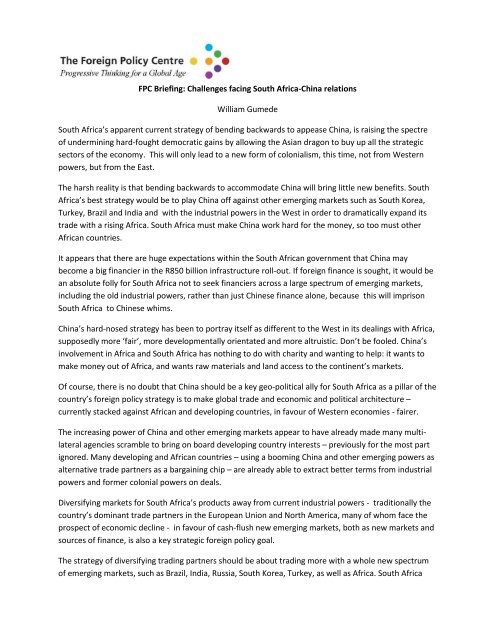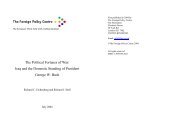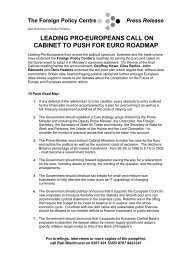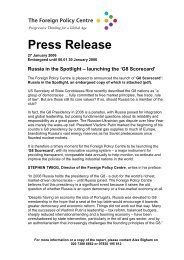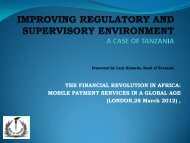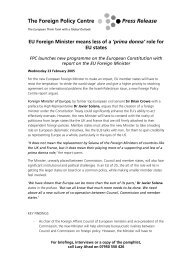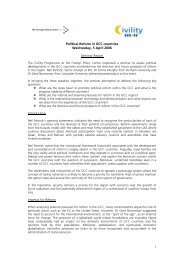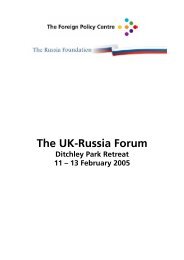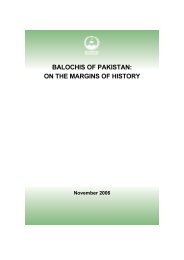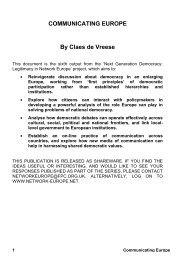FPC Briefing: Challenges facing South Africa-China relations ...
FPC Briefing: Challenges facing South Africa-China relations ...
FPC Briefing: Challenges facing South Africa-China relations ...
Create successful ePaper yourself
Turn your PDF publications into a flip-book with our unique Google optimized e-Paper software.
<strong>FPC</strong> <strong>Briefing</strong>: <strong>Challenges</strong> <strong>facing</strong> <strong>South</strong> <strong>Africa</strong>-<strong>China</strong> <strong>relations</strong><br />
William Gumede<br />
<strong>South</strong> <strong>Africa</strong>’s apparent current strategy of bending backwards to appease <strong>China</strong>, is raising the spectre<br />
of undermining hard-fought democratic gains by allowing the Asian dragon to buy up all the strategic<br />
sectors of the economy. This will only lead to a new form of colonialism, this time, not from Western<br />
powers, but from the East.<br />
The harsh reality is that bending backwards to accommodate <strong>China</strong> will bring little new benefits. <strong>South</strong><br />
<strong>Africa</strong>’s best strategy would be to play <strong>China</strong> off against other emerging markets such as <strong>South</strong> Korea,<br />
Turkey, Brazil and India and with the industrial powers in the West in order to dramatically expand its<br />
trade with a rising <strong>Africa</strong>. <strong>South</strong> <strong>Africa</strong> must make <strong>China</strong> work hard for the money, so too must other<br />
<strong>Africa</strong>n countries.<br />
It appears that there are huge expectations within the <strong>South</strong> <strong>Africa</strong>n government that <strong>China</strong> may<br />
become a big financier in the R850 billion infrastructure roll-out. If foreign finance is sought, it would be<br />
an absolute folly for <strong>South</strong> <strong>Africa</strong> not to seek financiers across a large spectrum of emerging markets,<br />
including the old industrial powers, rather than just Chinese finance alone, because this will imprison<br />
<strong>South</strong> <strong>Africa</strong> to Chinese whims.<br />
<strong>China</strong>’s hard-nosed strategy has been to portray itself as different to the West in its dealings with <strong>Africa</strong>,<br />
supposedly more ‘fair’, more developmentally orientated and more altruistic. Don’t be fooled. <strong>China</strong>’s<br />
involvement in <strong>Africa</strong> and <strong>South</strong> <strong>Africa</strong> has nothing to do with charity and wanting to help: it wants to<br />
make money out of <strong>Africa</strong>, and wants raw materials and land access to the continent’s markets.<br />
Of course, there is no doubt that <strong>China</strong> should be a key geo-political ally for <strong>South</strong> <strong>Africa</strong> as a pillar of the<br />
country’s foreign policy strategy is to make global trade and economic and political architecture –<br />
currently stacked against <strong>Africa</strong>n and developing countries, in favour of Western economies - fairer.<br />
The increasing power of <strong>China</strong> and other emerging markets appear to have already made many multilateral<br />
agencies scramble to bring on board developing country interests – previously for the most part<br />
ignored. Many developing and <strong>Africa</strong>n countries – using a booming <strong>China</strong> and other emerging powers as<br />
alternative trade partners as a bargaining chip – are already able to extract better terms from industrial<br />
powers and former colonial powers on deals.<br />
Diversifying markets for <strong>South</strong> <strong>Africa</strong>’s products away from current industrial powers - traditionally the<br />
country’s dominant trade partners in the European Union and North America, many of whom face the<br />
prospect of economic decline - in favour of cash-flush new emerging markets, both as new markets and<br />
sources of finance, is also a key strategic foreign policy goal.<br />
The strategy of diversifying trading partners should be about trading more with a whole new spectrum<br />
of emerging markets, such as Brazil, India, Russia, <strong>South</strong> Korea, Turkey, as well as <strong>Africa</strong>. <strong>South</strong> <strong>Africa</strong>
should let <strong>China</strong> compete with other economies, such as Japan, <strong>South</strong> Korea and Western economies,<br />
for example, partnering on projects, such as the country’s planned infrastructure investment drive.<br />
Last year <strong>South</strong> <strong>Africa</strong> was outraged when Janice Linden, a 38-year old black <strong>South</strong> <strong>Africa</strong>n woman was<br />
executed on December 12 by legal injection for allegedly being found in the possession of 3 kg of<br />
methamphetamine in the southern Chinese city of Guangzhou’s airport in 2008. <strong>South</strong> <strong>Africa</strong>n President<br />
Jacob Zuma tried but failed to secure a stay of execution. This failure to do so sparked anger across the<br />
country against <strong>South</strong> <strong>Africa</strong>’s impotence to persuade a supposedly close ally and made many question<br />
why <strong>South</strong> <strong>Africa</strong> was going out of its way to accommodate <strong>China</strong> politically, while the Chinese appeared<br />
not to attach the same value to <strong>South</strong> <strong>Africa</strong>.<br />
Home Affairs Director-General Mkuseli Apleni admitted that <strong>South</strong> <strong>Africa</strong> feared a “backlash” from <strong>China</strong><br />
similar to those experienced by France and Australia after they allowed the Dalai Lama to visit their<br />
countries. The Dalai Lama visited emerging markets Mexico and Brazil before, without any seemingly<br />
political or economic consequences.<br />
Some <strong>South</strong> <strong>Africa</strong>ns( including some sections of mainstream business, opposition parties) on the<br />
liberal conservative side (such as the Democratic Alliance) and the black conservative political spectrum,<br />
(such as the Inkatha Freedom Party), as well as some think tanks, oppose the whole idea outright that<br />
<strong>South</strong> <strong>Africa</strong> should have a strategic political and economic alliance with <strong>China</strong>. Many holding this view<br />
argue that <strong>South</strong> <strong>Africa</strong>’s strategic alliances should remain with the industrial West – North America,<br />
Australasia and Europe. Europe is currently still SA’s largest export market. Many activists on the left of<br />
the ANC-Cosatu-SACP also totally reject <strong>South</strong> <strong>Africa</strong>’s embrace of <strong>China</strong> as a geo-political and economic<br />
ally.<br />
Some leaders within the ANC-Cosatu-SACP tripartite alliance uncritically admire the Chinese<br />
development model, where democracy is conspicuous in its absence. Those who make such arguments<br />
are usually those who still embrace Soviet-style socialism – which influenced sections of the ANC<br />
tripartite alliance or those who have a very narrow view of democracy. These groups wrongly argue that<br />
democracy is an obstacle to development. They claim that <strong>China</strong>’s dizzying economic growth rates<br />
‘prove’ their thesis that democratic niceties in <strong>South</strong> <strong>Africa</strong> are an obstacle to development and public<br />
service delivery. Among this group number many of those who incorrectly argue that <strong>South</strong> <strong>Africa</strong>’s<br />
constitution is an ‘obstacle’ to development. Chinese officials have been regularly inviting senior ANC<br />
leaders to ‘workshops’ in <strong>China</strong> and lecturing the more impressionable ANC leaders on the ‘Chinese<br />
way’ of pursuing economic development without democracy.<br />
Currently, the trade deficit between <strong>China</strong> and <strong>South</strong> <strong>Africa</strong> is skewed in favour of <strong>China</strong>. <strong>South</strong> <strong>Africa</strong><br />
exports cheap raw materials to <strong>China</strong> which does not create many jobs, while <strong>China</strong> exports labourintensive,<br />
manufactured products. The latter create jobs and are more valuable, and are often,<br />
ironically, made from cheap <strong>South</strong> <strong>Africa</strong>n raw materials and then exported back to <strong>South</strong> <strong>Africa</strong> in as
more expensive finished products. Chinese exports can easily enter <strong>South</strong> <strong>Africa</strong>n markets, but <strong>South</strong><br />
<strong>Africa</strong>n imports to <strong>China</strong> face a mountain of hurdles.<br />
The ANC government has been under intense criticism by allies and opponents alike, for not aggressively<br />
and dramatically up-scaling its strategy of beneficiating (turning it from raw materials into value-add<br />
products) <strong>South</strong> <strong>Africa</strong>n minerals; and for being too sluggish in boosting and protecting <strong>South</strong> <strong>Africa</strong>’s -<br />
squeezed manufacturing sector – now universally seen as the area in which mass jobs can be created.<br />
<strong>South</strong> <strong>Africa</strong> should tax the export of raw materials heavily – including, or especially those being<br />
exported to <strong>China</strong> – if it is are serious about beneficiation 1 .<br />
Alarmingly, <strong>China</strong> is buying into ‘strategic’ sectors in the SA economy, such as platinum, rare metals and<br />
the financial sector – which should be driving <strong>South</strong> <strong>Africa</strong>’s economic development.<br />
Many executives of <strong>South</strong> <strong>Africa</strong>n state-owned and private companies have warned about Chinese<br />
inroads into <strong>Africa</strong> – outmanoeuvring <strong>South</strong> <strong>Africa</strong>n companies, both private and state-owned. They<br />
have asked for active <strong>South</strong> <strong>Africa</strong>n government support for investment drives into <strong>Africa</strong> – or risk <strong>South</strong><br />
<strong>Africa</strong>ns losing out to <strong>China</strong> in <strong>Africa</strong> – saying that Chinese companies have an unfair advantage in <strong>Africa</strong><br />
because they are in effect subsidised by the Chinese state.<br />
In 2006, after lobbying by industry, trade unions and ANC members, <strong>South</strong> <strong>Africa</strong> persuaded <strong>China</strong> to<br />
sign a textile pact between the two countries which would limit imports from <strong>China</strong> and give the SA<br />
industry a period in which to rebuild. <strong>South</strong> <strong>Africa</strong> could have introduced tougher protectionist<br />
measures, such as those endorsed by the WTO and implemented by the US and EU. Etienne Vlok, a<br />
textile industry analyst argues that <strong>China</strong> agreed to a much more watered-down bilateral textile pact<br />
with SA because it feared that <strong>South</strong> <strong>Africa</strong> would copy the US and EU and implement much harsher<br />
protective steps.<br />
In May 2005, the US imposed temporary restrictions on textiles and clothes from <strong>China</strong>. The restrictions<br />
were permitted under the “safeguard” clauses signed when <strong>China</strong> joined the WTO in 2001. WTO<br />
members can use the clauses to limit sudden and steep rises in imports from <strong>China</strong> until 2008. <strong>China</strong><br />
refused to renew the textile pact in 2009 and as a gesture of goodwill the <strong>South</strong> <strong>Africa</strong>n government<br />
blocked a trip by the Dalai Lama to <strong>South</strong> <strong>Africa</strong>, in the hope that this would show its commitment to its<br />
<strong>relations</strong>hip with <strong>China</strong>.<br />
<strong>South</strong> <strong>Africa</strong>’s textile industry is uncompetitive compared to <strong>China</strong>’s because <strong>South</strong> <strong>Africa</strong> does not give<br />
local industry the same level of direct and indirect subsidies that the Chinese do.<br />
<strong>South</strong> <strong>Africa</strong>’s ferrochrome producers have been calling for government support to help them compete<br />
with their Chinese counterparts. The Chinese government subsidises various raw material imports,<br />
including chromium, as part of fostering a beneficiation strategy. <strong>China</strong> imposes a 40% export duty on<br />
1 In this context the term describes the proportion of the value derived from asset exploitation which stays 'in country' and benefits local<br />
communities.
metallurgical coke, which is the sole ingredient that <strong>South</strong> <strong>Africa</strong>n ferrochrome producers import —<br />
largely from <strong>China</strong>. Frans Baleni, the General Secretary of the National Union of Mineworkers says the<br />
Chinese were also stockpiling chrome and ferrochrome in order to dictate future commodity prices. This<br />
is the sort of Chinese behaviour that <strong>South</strong> <strong>Africa</strong> needs to respond to more strategically.<br />
Chinese companies are actively purchasing shares in SA mining companies , appearing to focus on<br />
strategic minerals in the sectors in which struggling black miners are overrepresented. . Since most black<br />
miners lack access to finance, Black Economic Empowerment (BEE) (in which black shareholders gets<br />
shares in white-owned companies as part of economic redistribution), these deals are often financed by<br />
established (white-owned) mining companies lending would-be black buyers the money to purchase<br />
stakes in these assets. However, many of these deals have unraveled as black part-owners find it<br />
increasingly difficult to finance their debts through dividend payments. Many of these black miners are<br />
now hoping that Chinese companies can provide the required credit .<br />
In <strong>Africa</strong>, <strong>China</strong>’s strategy has appeared to one of securing trade by lavishing largesse on individual<br />
political leaders, particularly presidents and ruling parties. Many of Zuma’s opponents allege that the<br />
president and his family have been on the receiving end of such Chinese favour – an allegation which<br />
the president has vehemently denied.<br />
Trade unions and civil society groups in SA have consistently complained that Chinese companies in<br />
<strong>South</strong> <strong>Africa</strong> undermine basic workplace rights and environmental standards. Cosatu, for example, has<br />
insisted that all Chinese companies investing in SA sign minimum labour rights agreements.<br />
But <strong>South</strong> <strong>Africa</strong> should also be more pro-active: identifying the sectors and areas that Chinese and<br />
other companies should invest in as part of a longer term integrated economic and infrastructure<br />
development plan. <strong>South</strong> <strong>Africa</strong> should assertively decide where development should take place, what<br />
should be developed and then partner with Chinese or other foreign investors in these home-grown<br />
targeted development initiatives. <strong>South</strong> <strong>Africa</strong>’s mineral beneficiation programme is a good example.<br />
Sadly, however the general pattern of Chinese investments in <strong>Africa</strong> appears to be that the Chinese<br />
decide what and where they invest in a particular <strong>Africa</strong>n country, mimicking <strong>Africa</strong>’s colonial, Cold War<br />
investments and aid-driven economic patterns, which brought economic growth with little<br />
industrialisation, broad-based development or new human development opportunities.<br />
<strong>China</strong> needs SA and <strong>Africa</strong>’s raw materials to keep on growing at a fast rate in order to keep the millions<br />
of impoverished Chinese on board. <strong>China</strong> also needs to export its products – light manufacturing and<br />
heavy machinery – to <strong>Africa</strong>n markets, feed its hungry with food from <strong>Africa</strong> and benefit from jobless<br />
growth in <strong>Africa</strong>. The moment Chinese economic growth slacks and the economic benefits flowing to<br />
millions of poor Chinese slow, North <strong>Africa</strong>n-style revolt against the one-party state will become a reality<br />
in <strong>China</strong>. That means <strong>China</strong>’s long-term stability is uncertain: <strong>South</strong> <strong>Africa</strong> should not hedge all its bets<br />
on <strong>China</strong>.
<strong>China</strong> also needs SA as a strategic political ally, not only against the hostile West, but also to secure the<br />
friendships of other <strong>Africa</strong>n and developing countries – which <strong>South</strong> <strong>Africa</strong> has strategic <strong>relations</strong> with.<br />
Many industrial countries are increasingly rejecting Chinese investments in their strategic sectors. Some<br />
industrial countries may appear to be on the decline, but this decline is not likely to be rapid, and may<br />
also be reversed, as in the case of Germany.<br />
Moreover, the EU is still the biggest buyer of SA products: any rapid adjustments to make <strong>China</strong> the new<br />
market for all the products currently being exported to industrial nations are going to be very costly and<br />
painful to the <strong>South</strong> <strong>Africa</strong>n economy. New emerging powers, such as <strong>China</strong>, may be flush with cash, but<br />
they have poverty, development and inequality challenges to overcome – if these are not managed well,<br />
this may ultimately undo their future political stability and economic prosperity. Neither ideology, nor<br />
romanticism should drive <strong>South</strong> <strong>Africa</strong>’s strategic economic decisions: pragmatism and real life realities<br />
should.<br />
At the heart of such a strategy with giant <strong>China</strong>, a tiny <strong>South</strong> <strong>Africa</strong> will have to box-clever. <strong>South</strong> <strong>Africa</strong><br />
must improve the use of all the resources available to it, including from its public sector, private sector<br />
and wider civil society, the ideas, skills and finance to negotiate better deals. It will be important that<br />
<strong>South</strong> <strong>Africa</strong> forges a partnership between its government, business, labour and civil society, to provide<br />
the capacity to develop competitive strategies for dealing with not only <strong>China</strong>, but also other emerging<br />
and industrial country competitors. There are <strong>South</strong> <strong>Africa</strong>n companies such as Sappi and SABMiller,<br />
who have done incredibly well in <strong>China</strong> and other emerging markets: their capacity must be leveraged to<br />
come up with better long-term country strategies.<br />
For example, in the cases of the textile and ferrochrome sectors, sector partnerships between<br />
government, organised labour and business should be worked out to develop a strategic approach.<br />
Thus, SA negotiation teams need to be beefed-up with expertise from the private sector, civil society<br />
and academia, allowing <strong>South</strong> <strong>Africa</strong> to be able to adequately compete with <strong>China</strong>.<br />
Most of the East Asian developmental states have forged an effective partnership between the public<br />
and private sectors to come up with common strategies to enhance their countries’ competitiveness. In<br />
addition, domestic <strong>South</strong> <strong>Africa</strong>n companies are currently sitting on a surplus cash pile which exceed<br />
GBP£45 billion, according to the most recent figures from Nedgroup Investments. Cooperative and<br />
trusted <strong>relations</strong>hips must be nurtured between <strong>South</strong> <strong>Africa</strong>n business and government in order to<br />
leverage this cash surplus for investment purposes, especially for infrastructure.<br />
In general, <strong>South</strong> <strong>Africa</strong>’s industrial, trade and labour market policies are not synchronised. A case in<br />
point is the attempt to make the <strong>South</strong> <strong>Africa</strong>n currency more competitive against competitor<br />
currencies. These attempts are not coordinated with other macro- and micro-economic policies – which<br />
could help <strong>South</strong> <strong>Africa</strong>’s struggling manufacturing sector. Another case in point is the <strong>South</strong> <strong>Africa</strong>n<br />
state energy utility, Eskom’s, rising energy prices despite the lack of a reliable power supply which is<br />
adversely affecting <strong>South</strong> <strong>Africa</strong>n ferrochrome production. Nonetheless Interventions to overcome such
inefficiencies appear to be slow and uncoordinated. Furthermore, <strong>South</strong> <strong>Africa</strong> has the largest<br />
indigenous Chinese diaspora communities in <strong>Africa</strong>: it is a tragic waste that the <strong>South</strong> <strong>Africa</strong>n<br />
government is not using the skills of these <strong>South</strong> <strong>Africa</strong>ns to help forge a more strategic approach<br />
towards <strong>China</strong>.<br />
William Gumede is Honorary Associate Professor, Graduate School of Public and Development<br />
Management, University of the Witwatersrand. He is the author of the bestselling Thabo Mbeki and the<br />
Battle for the Soul of the ANC.


